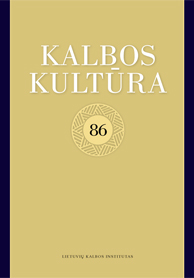DIDELIS DĖKUI IR DĖKUI LABAI DABARTINĖJE LIETUVIŲ (RAŠTO) KALBOJE
DIDELIS DĖKUI AND DĖKUI LABAI IN THE MODERN LITHUANIAN (WRITTEN) LANGUAGE
Author(s): Loreta Vaičiulytė-SemėnienėSubject(s): Theoretical Linguistics, Syntax, Semantics, Baltic Languages
Published by: Lietuvių Kalbos Institutas
Keywords: thank-you construction; interjection; inverse order of words; thematic-rhematic structure; interlanguage communication;
Summary/Abstract: The article deals with the question whether the thank-you constructions dėkui (ačiū) labai, nuoširdžiai (thank you very much, with all my heart) and didelis, nuoširdus dėkui (ačiū) (many, sincere thanks) are fit to use in the modern Lithuanian language. The thank-you constructions are addressed in a syntactic-semantic and thematic-rhematic structure aspect. The study relies on material gathered in the Corpus of the Modern Lithuanian Language (CMLL) by the Centre of Computational Linguistics of Vytautas Magnus University and the online translations dictionary LINGUEE. Analysis of CMLL cases where the Lithuanian words for thanks, dėkoju, dėkingas, -a, padėka, -ą, dėkui, ačiū, are used with prepositional and postpositional modifiers has shown that in the modern Lithuanian language, dėkui labai is used by the analogy of dėkoju labai, labai esu dėkingas (I am very grateful), which is to say by choosing a marked strategy of expression of thanks in a creative and competent way. The inverse dėkui labai is just as appropriate to use as other stylistically marked cases of expression. The addresser tends to choose an inverse order of words in a thank-you construction rarely (6.6proc. of all cases, or 53 cases out of 800). In terms of word order and thematic-rhematic structure, the subject material allows mapping the following correlations of thank-you expressions. In (in)transitive sentences with neutral word order, the typical subject (I) that is marked by the nominative mirrors an unmarked topic, or theme, that is related to the principles of topicworthiness: different values of animacy, agency, definiteness, and so on (Aš nuoširdžiai dėkoju Jums / esu nuoširdžiai dėkingas už pagalbą (I thank you with all my heart / I sincerely thank you for your help); Aš tariu Jums nuoširdžią padėką (I am extending my sincere thanks to you)). When it comes to topicworthiness, the indirect object of the dative (to you) ranks second after the subject nominative to become the topic of the sentence.
Journal: Bendrinė kalba (iki 2014 metų – Kalbos kultūra)
- Issue Year: 2019
- Issue No: 92
- Page Range: 1-34
- Page Count: 34
- Language: Lithuanian

